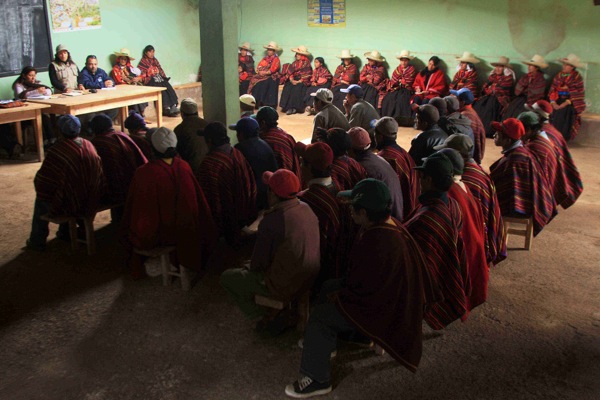Peru: Application of prior consultation law risks mining project delays
The expansion of the definition of indigenous communities' benefited Quechua-speaking highland groups.
A recent decision by Peru's government to require mining companies to carry out prior consultation with indigenous communities is set to further complicate the investment climate at a time when the sector is struggling as a result of low prices and a slowdown in investment. On 12 November, Deputy Culture Minister Patricia Balbuena announced that following a long internal debate the government had decided that indigenous communities in the country's mineral-rich highlands would qualify for prior consultation under the terms of Law No.29785, passed in 2011.
The new policy reverses the government's previous position that communities meeting the definition of indigenous' were overwhelmingly concentrated in the Amazon basin, which is home to sizeable oil and gas reserves but few mineral deposits. The expansion of the definition of indigenous communities' to include Quechua-speaking highland communities means that companies looking to initiate mining activities in mineral-rich departments such as Cusco, Ayacucho and Apurimac will in many cases be required to fulfil the requirements laid out in Law No.29785. Indeed, according to Balbuena, the law will also be applied retroactively, with at least eight projects already in the exploration stage being required to undergo prior consultation before proceeding any further.
Policy change adds to bureaucratic obstacles facing investors
The most immediate consequence of the government's decision will be the creation of an additional bureaucratic hurdle for mining companies, many of whom already cite onerous permitting requirements as a deterrent to operating in Peru. Although the country's taxation and regulatory framework is broadly favourable to private investment in extractive industries, prominent figures within the mining sector have publicly blamed the proliferation of red tape for the fact that a growing number of exploration projects are in limbo. The government has previously proved attentive to these concerns, introducing reforms aimed at simplifying administrative procedures and speeding up permitting processes in the mining sector. This latest decision will cancel out those gains, leading to substantial delays in the approval of new projects and even leading some projects already at the exploration stage to be placed on hold while consultations are carried out.
Furthermore, this latest U-turn by the government in its policy towards the extractive sector underlines the lack of policy stability that has characterised the administration of President Ollanta Humala. During its four years in office, the government has oscillated between attempting to boost Peru's attractiveness as a destination for extractive-sector investment and tightening environmental and social regulations in a bid to prioritise the needs of communities in resource-rich areas. While the resulting frequent policy changes have been less damaging than the nationalisations that some feared when the left-leaning Humala came to power, they nevertheless undermine the stability of the investment framework and affect investors' ability to plan ahead. Moreover, this is unlikely to be the final change. While Balbuena claims that the debate is over' and that the applicability of the prior consultation law to mining projects is now set in stone, the decision comes less than a year before Humala is due to depart from office. The next administration may favour a different interpretation of Law No. 29785, possibly leading to further changes in the permitting requirements confronting investors.
Institutional weaknesses mean new requirements not guaranteed to alleviate social unrest
It remains unclear whether the government's decision will achieve its goal of ensuring that projects enjoy social licence to operate and reducing rates of mining-related conflict. Although the delays it causes will inevitably inconvenience investors, the change in policy is also intended to benefit them by ensuring that highland communities are consulted about projects, reducing the risk that unaired grievances will fuel disruptive social unrest at a later stage. However, Peru's prior consultation law remains relatively untested, and there are significant unanswered questions regarding how it will apply in practice. In particular, there are doubts regarding the capacity of the Ministry of Culture to adequately oversee the consultation process, meaning that there is no guarantee that consultations will be successful in gauging local opinion about projects. In this context, the government's decision could substantially add to the burden of red tape facing investors, while failing to reduce the risk that they will become the targets of community unrest further down the line.
By Katie Micklethwaite, Senior Latin America Analyst at risk analysis company Verisk Maplecroft.

